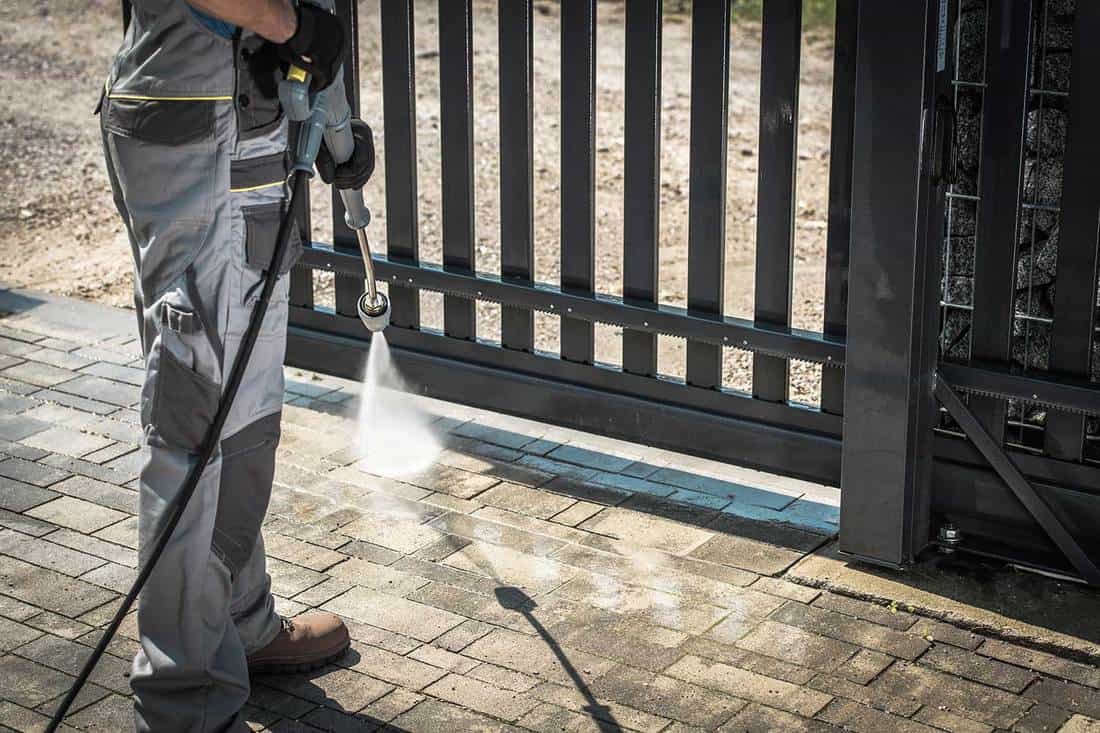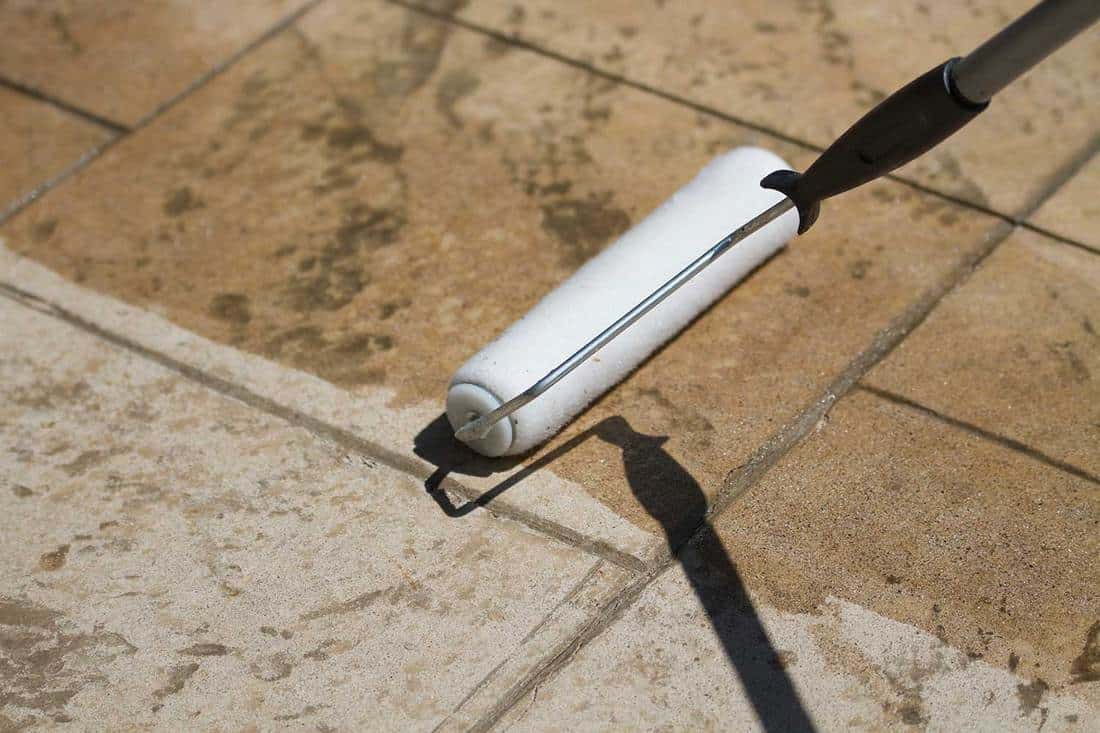The driveway of your home is a hot spot for activity. With the daily wear and tear from vehicles and weather conditions, how do you protect the concrete? There is some back and forth over whether it is necessary or not, but adding a sealant to your concrete driveway could end up saving you big bucks in the future. We've looked into the pros and cons of sealing your concrete driveway, plus more!
Sealing a concrete entryway has more pros than cons. In the long run, it is worth the time and energy to put the care into sealing concrete. Sealable concrete surfaces can also include sidewalks and outdoor patios. The process of applying the new coating can be done yourself or you can hire a professional contractor.
These concrete surfaces will be subjected to vehicles, passersby, and exposure to the elements. You may think that only harsh winters can take a toll on concrete, but large amounts of UV rays from the sun can also inflict damage over time. Below, we've researched when and how often you should seal exposed concrete. As well as a few techniques and general cost breakdowns. Take a peek to learn more about your next project.
![A pressure washing the driveway and gate, Should You Seal Your Concrete Driveway? [A Thorough Look At Pros And Cons]](https://homedecorbliss.com/wp-content/uploads/2021/04/Should-You-Seal-Your-Concrete-Driveway-1.png)
Sealing Your Concrete Driveway
With the prices of homes rising, it would be worthwhile to begin investing in your current home's maintenance. Especially in unrelenting outdoor conditions, an unsealed driveway can do the following: flake and crack from heat, shift and crack from freezing water, and attract mold from water held in the cracks. A cracked and uneven concrete walkway is on its way to becoming a hazardous zone for tripping and slipping.
We sometimes add affiliate links and content that was curated and created by our team with the help of advanced ai tools to help showcase the best design styles.

Advantages
- Adds value to the home
- Improves curb appeal
- Lengthens the life of concrete
- Inexpensive and straightforward
- Lowers likelihood of cracking and flaking
- Safeguard against oil spills and stains
- Moisture resistant
Disadvantages
- Long curing time
- It may require multiple tools
- Oil runoff and water pollution
When should I seal my concrete driveway?
An ideal time frame would be the warmer seasons, after May and before September. One thing to take into consideration will be rain and sprinklers. Before starting your endeavor, check to make sure it won't rain before, during, and after the day you choose to start. You will also need to ensure that your sprinkler system will not go off during this time frame, as water will throw a wrench into the needed circumstances.
Click here to view this concrete sealer on Amazon.
When it comes to temperatures, for a rule of thumb, aim to start in the morning when the temperature is in the 70s and reach the higher 80s by the afternoon. By having a large heat source, the sealant will dry faster and absorb easier. Cold temperatures prevent sealant from staying loose enough to be pulled into the concrete. You will want to allow the sealant at the very least seven hours to get settled.
The best-case scenario would be to allow a full 24 hours before touching the sealant and then allowing it a full week to fully cure before allowing heavy machinery onto it. Due to the fact it needs a long curing period, this would be a perfect project to do right before a vacation when it won't be in use every day.
How do I prepare my driveway for sealing?
Before heading off to your local home improvement store for concrete sealant, take a good look at your driveway. Are there cracks or holes? Have weeds or roots grown in between the cracks? The first step to prepare for sealant will be mending these issues. Not refurbishing cracks, even if they're hairline cracks, increases moisture's chances of getting stuck. Regarding holes, if the depressions aren't properly cleaned out and filled in, the sealant could miss its full surface area contact and leave a weak spot in your driveway.

The next step will be to clear away any debris. This includes weeds, leaves, planters, hoses, and the such. You will want your driveway to be a completely clean slate for a smooth operation. Deweeding will ensure that if you accidentally roll off the concrete's edge, dirt and grass will not get stuck in the sealant. Finally, you will be able to pressure wash your concrete. If you are pressure washing a surface that is heavily stained with oil, make sure to follow local water run-off guidelines.
Click here to view this electric power washer on Amazon.
How often should I seal concrete?
A standard number would be once every three years. Concrete located in a milder climate can be extended to once every four years, while harsher climates can allow up to once every two years. Harsh climates would include anywhere that it heavily snows and requires a sizeable amount of salt put on the ground. Water that freezes in the unsealed cracks of concrete will swell and widen cracks. Over time without proper upkeep, the concrete will begin to come loose and deteriorate.
Asphalt
For added reference, asphalt is different than concrete. While both are made from stone and sand, asphalt is petroleum-based, while concrete is cement-based. Asphalt has the signature look of a black surface finish. These types of driveways can be sealed once every two to three years. Whereas driveways made from asphalt can be less expensive to install, it involves a much more complicated and messy process. Sealant for asphalt is sticky, can stain clothing, and will require a mask to limit breathing in vapors.
Should you seal old concrete?
After inspecting your currently laid concrete infrastructures, determine if they are still in good quality or if they've seen better days. Unspoiled concrete will have little to no cracks, no large chips missing, and a smooth, even surface. A dilapidated area of concrete will be shifted, cracked, and stained by oil spills or paint.
Old concrete can be sealed if you know it has not been sealed before or has passed the four-year threshold. In this way, sealing older concrete can help not only restore it but, at the same time, it will enhance your home's curb appeal. No need to stop just at your driveway; you can seal your outdoor concrete patio too!
Can you apply a concrete sealer over an old sealer?
Over sealing your concrete will only hurt it. To determine if there is still an active sealer on your concrete, conduct an absorption test. Taking a bucket of water, carefully pour water onto various spots of the driveway. If the water immediately absorbs, it is more than likely that there is no active sealant present. On the other hand, if the water beads up and does not soak into the ground quickly, there is still sealant.
Some areas of your concrete may get more traffic than others and can cause an uneven distribution of sealant over time. It is not recommended to seal patches since the new sealant will not hold onto the old sealer. It will be necessary to first remove the old sealer with an etching chemical. Etching chemicals are acid-based and should not be used around children or pets. Always be sure to be wearing protective foot coverings. For humid areas, it can take up to 72 hours for the solution to dry; otherwise, it will take around 48 hours.
Click here to view this sealer remover on Amazon.
Is it better to spray or roll a concrete sealer?
Spray and roller are the two methods to apply a sealer to concrete. The spray method involves a tank you will pour the sealant into and slowly spray onto the concrete. A roller method is very similar to painting a wall. You'll use a long-handled paint roller to spread the sealant.
While the roller method might take longer to complete, it gives you more control over how much sealant is being used. The spray would be the most time-efficient for larger driveways due to the ease of use. Either technique will require a second coat and a mindful eye to make sure no pooling occurs. Second coats can be applied four to five hours after or when the first coat is dry to the touch.
Aftercare for a sealed concrete area is nice and simple. All that would be required is soap and water! If you want to do an overall clean, sweep off debris, wet and soap your driveway, and lightly scrub away any built-up grime. The instructions from your sealants manufacturer will also include tips on how to keep your sealant from deteriorating.

How much does concrete sealing cost?
All and all, resealing on your own is going to be the least expensive option. Many home improvement stores have materials readily available for do-it-yourselfers looking to tackle projects around the house. You will save mainly on labor costs but still have to put out some cash for the materials. After cleaning your pathway, the materials needed will cost you anywhere between $150 to $300. Prices can depend on how much sealant you need for the square footage of your driveway and if you need to purchase extra degreasers for those tough oil stains.
Professional services will run anywhere between $700 to $2,000 starting at 400 square feet to 1,800 square feet at $1.80 per square foot. Professional services do not have a set price, and it can be tricky to receive a quote over the phone without the contractor seeing the driveway. Are there cracks? How big is the driveway? Will they need to clean it beforehand? Of course, there are the additional costs of labor, material, and clean-up, but you will be able to sit back and enjoy your weekend.
In Closing
Sealing your concrete driveway may not be necessary; however, there are more pros than cons to the decision. Your home's curb appeal will instantly get bumped up, and it will save you construction costs down the road to have any small repairs done. Putting manual labor back into your homestead is one of the most rewarding feelings! By completing this job yourself, you can save hundreds of dollars instead of hiring a contractor. Sealing concrete has become a user-friendly upgrade and will only take a weekend to put down.
Now that you've got the driveway looking new, take a look at these front-of-house ideas!



